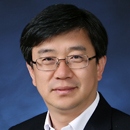Academic Editors
The following people constitute the Editorial Board of Academic Editors for PeerJ. These active academics are the Editors who seek peer reviewers, evaluate their responses, and make editorial decisions on each submission to the journal. Learn more about becoming an Editor.

Gavin J Phillips
Programme Director of Circular Engineering, Maastricht University.

Oliver A.H. Jones
My group conducts research on new analytical methods and technologies, particularly in multidimensional chromatography mass spectrometry and NMR. I also have had a long history of research in metabolomics and the trace analysis of environmental pollutants in complex matrices. Recently I have extended my work to include forensic chemistry and I also have an interest in bringing technology to Chemistry Education. Check out 'Chirality-2' on the app store and Google Play or follow me on Twitter (@dr_oli_jones).

Karin Ingold
Karin Ingold is Professor of Policy Analysis and Environmental Govenrance. Her main area of Research is climate Change Adaptation and mitigation as well as politics dealing with question of water Quality and quantity. She applies social Network Analysis and other quantitative and qualitative methods in her Research.

Bill Hooker
PhD = cloning and characterizing potential vaccine antigens from schistosomes; first postdoc = fine details of HIV replication (with David Harrich); second postdoc = best ignored; third postdoc = role of Max network, especially Mnt, in cancer and development (with Peter Hurlin). After that I made HIV POC tests and other diagnostic devices in two small biotech companies. Now I'm a research manager with Canon US Life Sci.

Hao Wu
Hao Wu is a patent scientist in an oncology-focused biotechnology company, Exelixis, Inc. She obtained her Ph.D. in molecular biology from Rowan University (previously known as the University of Medicine and Dentistry of New Jersey (UMDNJ) – Stratford Campus). With hands-on knowledge in various aspects of biology, including molecular biology, cell biology, biochemistry, immunology, neuroscience, oncology, Hao has worked on inventions spanning a broad range of technologies, for example, biologics, antibodies, biomarkers, diagnostics, cell therapy, gene therapy, and sequencing.

Joshua S Davis
Josh is a clinician researcher, and divides his time between clinical work as an Infectious Diseases physician in Newcastle, and research work as a principal research fellow based at Menzies.
He completed his clinical infectious diseases training in 2004, and then worked on a PhD from 2007-2010 on the epidemiology, pathophysiology and adjunctive treatment of sepsis in the Top End of the Northern Territory (NT).
His main clinical interests are general infectious diseases, viral hepatitis, refugee health and infections in the critical care setting. His main research interests are clinical trials in the management of severe infections and epidemiology of severe bacterial infections.
Josh is the past president of the Australasian Society for Infectious Diseases (ASID) and is a career development fellow of Australia's National Health and Medical Research Council. In the 10 years since completing his PhD, he has over 140 peer-reviewed publications and an h-index of 31.

Arsham Alamian
Dr Alamian is Associate Dean for Health Studies and Associate Professor at University of Miami (UM) School of Nursing and Health Studies (SONHS). A fellow of the American College of Epidemiology, Dr Alamian oversees the public health and health science programs of the UM SONHS. Dr Alamian’s research interests include cluster-risk and theoretical modeling of risk behaviors and risk factors for chronic disease including metabolic syndrome, diabetes, and cardiovascular disease. He has been investigator on multiple NIH and state grants on pediatric obesity, metabolic syndrome, and biomarkers for chronic liver disease. Dr Alamian received his doctoral degree in public health, with specialization in epidemiology, from the University of Montreal School of Public Health. He completed a fellowship in public health through a Canadian Institutes of Health Research fellowship program at McGill University, and holds a master of science degree in pharmacy, with specialization in pharmacoepidemiology, from Laval University.

Doil Choi
Professor of the Department of Plant Science and Director of Plant Genomics and Breeding Institute of Seoul National University, Korea

Stanisław H. Czyż
Stanisław Czyż is Associate Professor within the Faculty of Physical Education and Sport Sciences at the Wroclaw University of Health and Sport Sciences in Poland. He is Associate Professor (Incubator of Kinanthropology Research) at Masaryk University in Brno, Czechia; and Extraordinary Associate Professor within the Physical Activity, Sport, and Recreation focus group at North-West University, South Africa.

Jian Song
Since 2016 Dr. Jian Song has been Priv.-Doz of Experimental Immunology within the Institute of Physiological Chemistry and Pathobiochemsitry at the University of Münster, Germany. He received his PhD of Molecular Medicine from Cologne University, Germany.
Dr. Song's research interests include investigating the role of basement membranes and matrix metalloproteinases in leukocyte extravasation into the brain and into the tumour microenvironment using intravital imaging and scRNA technology

Jose M Montoya
Senior Researcher at the Theoretical and Experimental Ecology Station, CNRS, at Moulis, France. Leader of the Ecological Networks and Global Change Research Group.

Esteban Balseiro
Dr. Esteban Balseiro is a CONICET Researcher and Professor of Ecology at University of Comahue, Argentina. His area of interest is plankton ecology, food web interaction and ecological stoichiometry. In addition, to this he also researches stream ecology, ecological stoichiometry of aquatic insects and effect of climate change on freshwater food webs.

